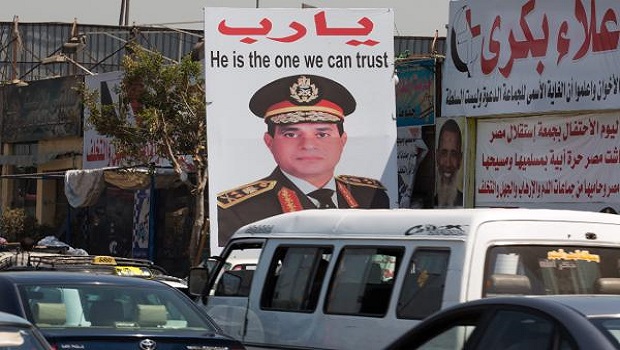
A huge placard depicting Egyptian army chief Abdel-Fattah Al-Sisi is seen in Cairo, Egypt, 01 August 2013. EPA/MICHAEL KAPPELER
The controversy surrounds Sisi’s comments in a rare interview with the Washington Post last week, in which he criticized the US, and called on it to use its influence to push the leadership of the Muslim Brotherhood to negotiate with Egypt’s new government.
Some observers said Sisi was attempting to find ways to reduce tension, and that it was the Muslim Brotherhood who called for Western help first, while others criticized Sisi’s comments saying “they opened the door for Western interference in Egyptian internal affairs.”
During the interview, which was published on Saturday, Sisi said “the US Administration has a lot of leverage and influence with the Muslim Brotherhood, and I want them to use this in order to end the crisis.”
He indicated that the army would not intervene to end Mursi supporters’ protests, adding: “the party who will put an end to these protests, will not be the army, because there is a police force who has such duties.” He added that “on July 26, more than 30 million people took to the streets in support for me, and they expected me to do something.”
Sisi questioned the role played by the West in recent events in Egypt. He said: “What is the role of the US, the EU and all international powers who support Egypt’s security and stability? Are the values of liberty and democracy only valid for your countries? Have you given up on Egyptians and turned your backs on them. They will not forget that.”
Sisi said the problem between the former president and the people was a result of the Muslim Brotherhood’s ideology and political philosophy, which is based on a return of the Islamic religious empire.
He added that the Brotherhood’s ideology put the Brotherhood above the state, which resulted in Mursi appearing not to be a president of all Egyptians, but a president of his followers and supporters.
He said: “We were all eager to help him succeed. If we wanted to oppose him or not allow the Brotherhood to rule Egypt, we could have done something during the elections, as the case used to be in rigging elections in the past. Unfortunately, the former president entered into disputes with almost every state institution. When a president enters into disputes with state institutions, the chances of his success become very limited. From another viewpoint, the president was trying to call in supporters from religious groups,” stressing that the differences between him and Mursi became clear from the first day that he was appointed defense minister.
Sisi claimed that the reason for the army’s intervention to remove the first democratically elected president of Egypt stemmed from the increase in protests against Mursi which accused him of allowing the Brotherhood to control the state, and destroy an already struggling economy.
He said “if we had not made a move, the situation would have resulted in civil war. This is what I told Mursi four months before he was ousted,” adding that “what I want you to know, and what I want the American readers to know, is that this issue is about a free people who rebelled against an unjust political system, and this people needs your support.”
On his aspiration for presidency, Sisi said “what is important in my life is overcoming the difficulties and ensure we live in peace, and to follow up our road map in order to reach the next elections without any bloodshed.”
Sisi said he has not received any calls from President Obama since the ouster of Mursi, but that he was in constant contact with Defense Secretary Chuck Hagel. Sisi criticized Washington’s suspension of the delivery of the F-16 jets to Egypt, saying “national armies are not treated this way.”
George Ishak, a member of the National Salvation Front (NSF) and founding member of Kefayah Movement and the National Society for Change, told Asharq Al-Awsat that “Sisi played a nationalist role which was very powerful and he protected Egypt’s revolution,” but advised him to limit his political statements.
Ishak said accusations that Sisi opened the door for Western intervention were untrue, because the Muslim Brotherhood, in their protest at the Rabaa Al-Adawiya square, were the ones who openly called for foreign intervention. He claimed that what Sisi had said was that “since Washington was supporting the Brotherhood, then it should have intervened to restore calm.”
However, political analyst and former assistant foreign minister, Ibrahim Yusri, told Asharq Al-Awsat: “The other side [the Islamist movement] clearly said they rejected foreign intervention, according to reports in the media, and according to what the Americans themselves said.” He added that “Sisi is still new to politics and needs advisers before making such comments,” and that “he has asked another country to help resolve the Egyptian problem, despite the fact that he has the authority, and can resolve people’s problems, which should be resolved through dialogue.”
